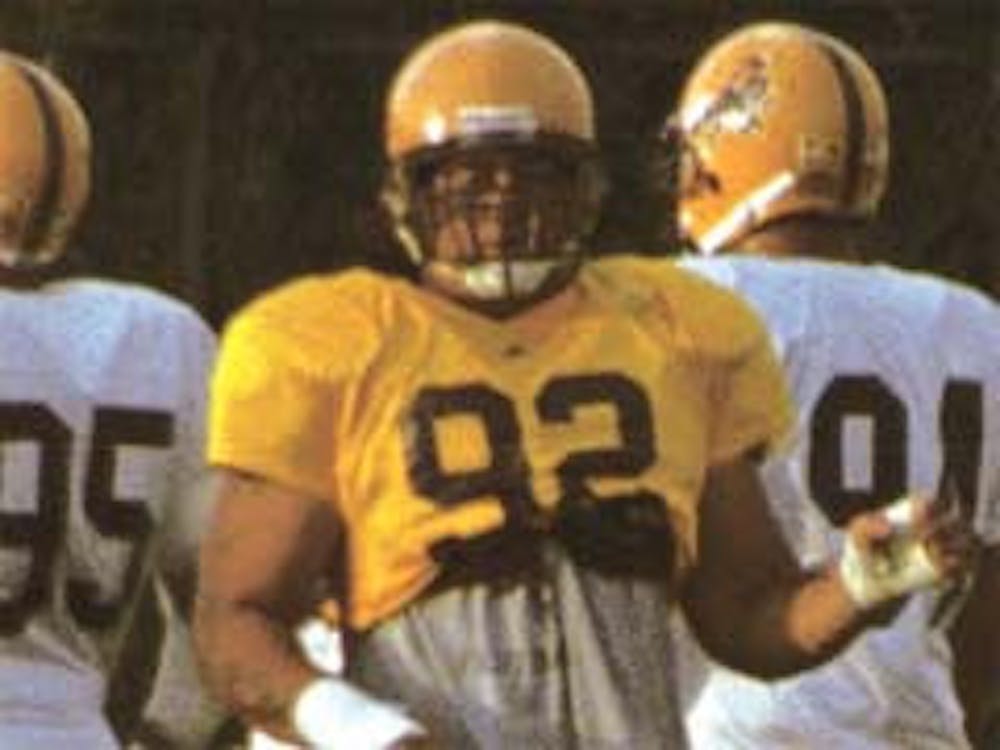It's almost too common to hear about well-known athletes in trouble with the law.
And ASU is no exception to the rule.
Since senior defensive tackle for the ASU football team Danny Masaniai pleaded guilty July 29 to a misdemeanor charge of disorderly conduct with a weapon, ASU has revised its current student-athlete code of conduct to include a section with stipulations pertaining to weapons.
"The revised code provides a good mechanism for us to deal with behavioral issues that are inappropriate and do not represent the families or the teammates or the University of those student-athletes involved in the issues," ASU athletics director Gene Smith said.
According to Superior Court records, Masaniai became upset when employees at the Acme Roadhouse on Rural Road and Eighth Street in Tempe would not permit him to enter the bar while wearing his ASU football jersey on May 10.
Masaniai allegedly threatened to shoot an employee, but instead left and later returned that evening, firing several gunshots in the air.
Tempe police proceeded to Masaniai's apartment, where Masaniai admitted to arguing with the employees and confirmed that he owned a .380 gun. As stated in court records, a .380 casing was found on the hood of Masaniai's car.
The day after the incident Masaniai was suspended for the first two games of the season.
The Masaniai case, and his suspension, brought to light the lack of punishment for weapons offenses in the old code of conduct for student-athletes.
The advisory panel and athletics director said they had felt, for the past year, that the policy's structure needed change. The old code, which had been under revision since January, contained reprimands for major offenses committed by student-athletes, but did not include information about weapon use.
A recently revised code includes a new section that addresses the weapons problem directly.
Sun Devil junior left tackle Regis Crawford is one athlete who agrees with the addition of the weapons statute.
"My motto has always been if you need a gun to go somewhere, don't go," said Crawford, Masaniai's teammate.
"We've seen it firsthand with one of our student-athletes, but I don't think it's a big deal because not a lot of people I know are carrying around [weapons]," Sun Devil senior linebacker Mason Unck said. "If people keep carrying that stuff around, how much do you want them on your team anyway?"
ASU Senior Associate Director Sandy Hatfield-Clubb said the old code was also difficult for many student-athletes to understand.
"It was very legal-minded," Hatfield-Clubb said. "It was not easy to read or interpret."
For an offense to have been deemed "major," under the old code, a student-athlete had to be convicted of, or plead guilty or no contest to anything that was a felony in Arizona.
The revised policy, which considers crimes involving weapons to be a major offense, states that a student-athlete could be subject to punishment if he or she "admits to, is convicted of, or pleads guilty or no contest to any offense involving the manufacture, transport, sale, transfer, possession or use of a weapon."
"The last revision we just made, adding weapons as a felony issue, one that could cause suspension or expulsion, was a great addition considering where we are today in this world where guns are more prevalent than they have been in the past," Smith said.
In cases involving major offenses, student-athletes could be suspended for a full year. Financial aid also may be revoked.
Upon completing a one-year suspension, student-athletes are not automatically reinstated on a team. They must follow procedures listed in the code to become eligible again.
"The revisions are great for us and great for our kids," Smith said. "They are easily understood and there are no gray areas, and that is important."
All student-athletes have been made aware of the code, the responsibilities they must fulfill and the consequences that can be brought against them.
Hatfield-Clubb, who acts as an intermediary between the athletics department and student-athletes, informed all incoming freshmen and transfers of the code during orientation sessions.
"I have to let them know it's not about them anymore, but about the whole picture," Hatfield-Clubb said. "They need to know their responsibility in representing the University."
Reach the reporter at katie.crane@asu.edu. Reporter Christopher Drexel contributed to this story.




